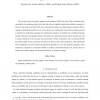Free Online Productivity Tools
i2Speak
i2Symbol
i2OCR
iTex2Img
iWeb2Print
iWeb2Shot
i2Type
iPdf2Split
iPdf2Merge
i2Bopomofo
i2Arabic
i2Style
i2Image
i2PDF
iLatex2Rtf
Sci2ools
ICASSP
2008
IEEE
2008
IEEE
Nested support vector machines
The one-class and cost-sensitive support vector machines (SVMs) are state-of-the-art machine learning methods for estimating density level sets and solving weighted classification problems, respectively. However, the solutions of these SVMs do not necessarily produce set estimates that are nested as the parameters controlling the density level or cost-asymmetry are continuously varied. Such a nesting constraint is desirable for applications requiring the simultaneous estimation of multiple sets, including clustering, anomaly detection, and ranking problems. We propose new quadratic programs whose solutions give rise to nested extensions of the one-class and cost-sensitive SVMs. Furthermore, like conventional SVMs, the solution paths in our construction are piecewise linear in the control parameters, with significantly fewer breakpoints. We also describe decomposition algorithms to solve the quadratic programs. These methods are compared to conventional SVMs on synthetic and benchmar...
Related Content
| Added | 30 May 2010 |
| Updated | 30 May 2010 |
| Type | Conference |
| Year | 2008 |
| Where | ICASSP |
| Authors | Gyemin Lee, Clayton Scott |
Comments (0)

